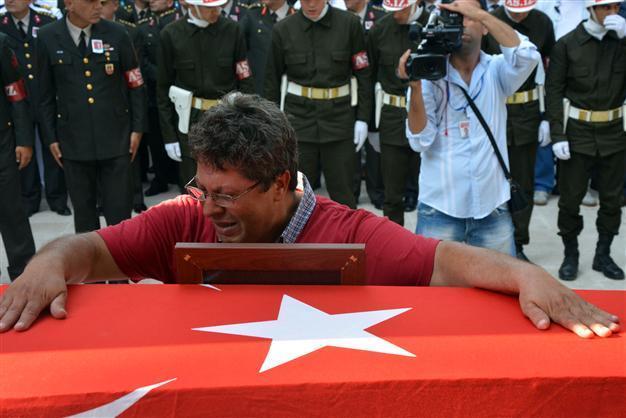Attacks reveal PKK prepared for war during peace talks: Analyst
Uğur Ergan - ANKARA

DHA photo
Recent attacks by the outlawed Kurdistan Workers’ Party (PKK) which have killed more than 50 Turkish security forces have revealed that the group installed improvised explosive devices (IEDs) on roads while peace talks were continuing, a security analyst has told daily Hürriyet.In the deadliest attack since a cease-fire ended in July, eight soldiers were killed in the southeastern province of Siirt on Aug. 19.
PKK militants remotely detonated a bomb placed on the road linking Siirt to its district of Pervari during the passing of a military patrolling convoy, according to the Turkish General Staff.
The attacked prompted questions in Ankara about how and when the bomb was planted beforehand on the road and detonated remotely by PKK militants.
“It is a reality that security measures were relaxed during the peace process. Terrorists then planted explosives in key points of bridges and tunnels,” the analyst told Hürriyet.
PKK militants used 700-1,000 kilograms of explosives to mine the road and left only unlinked cable ends on the surface, according to the analyst who stressed that it was extremely difficult to detect such IEDs. Because the bombs were planted months ago as the Turkish government ostensibly pursued talks to solve the Kurdish issue, many roads have repeatedly been covered with fresh layers of asphalt.
“Now they come back to the road and just link the cable ends, which allows them to detonate the bomb remotely with a cellphone,” the analyst added.
‘Dual war on terror’
Freezing the peace process that aimed to find a final settlement to end the PKK’s three-decade-long insurgency, clashes started after Turkey was hit on July 20 by one of its deadliest attacks in recent years when 33 pro-Kurdish activists were killed in a suicide bombing on the Syrian border blamed on the Islamic State of Iraq and the Levant (ISIL).
The attack prompted a furious reaction from the PKK, who shot dead two police in their sleep, accusing them of collusion with ISIL.
The PKK has long said Ankara has effectively supported the jihadists in Syria and Iraq.
Ankara on July 24 launched its first air strikes against ISIL in Syria and then also began attacking targets of the PKK in northern Iraq, in a dual “war on terror.”
But so far the campaign against ISIL is very much on ice – for coordination purposes, according to U.S. and Turkish officials – while the strikes against the PKK have been relentless.
According to the latest figures published by the state-run Anatolia news agency, 440 PKK militants have been killed in the campaign, including 390 in air strikes on southeast Turkey and northern Iraq.
‘Peace process in difficulty’
The Marxist-Leninist-inspired PKK first formally took up arms against the Turkish state in 1984, launching an insurgency that has since claimed tens of thousands of lives.
Initially it demanded full-scale independence for Turkey’s Kurds in the southeast, although now the focus is on autonomy and greater rights.
Its leader, Abdullah Öcalan, held on a Turkish island since his extraordinary arrest by Turkish special forces in Kenya 1999, in 2013 declared a cease-fire which has been left in tatters by the current violence.
“The peace process is in great difficulty,” a Turkish government official recently told Agence France-Presse.
“As long as the PKK refrains from giving a concrete timetable for disarmament, the operations will continue,” the official added.
Quite how peace negotiations can restart is unclear, with Öcalan deprived of visits and cut off from the process.
















